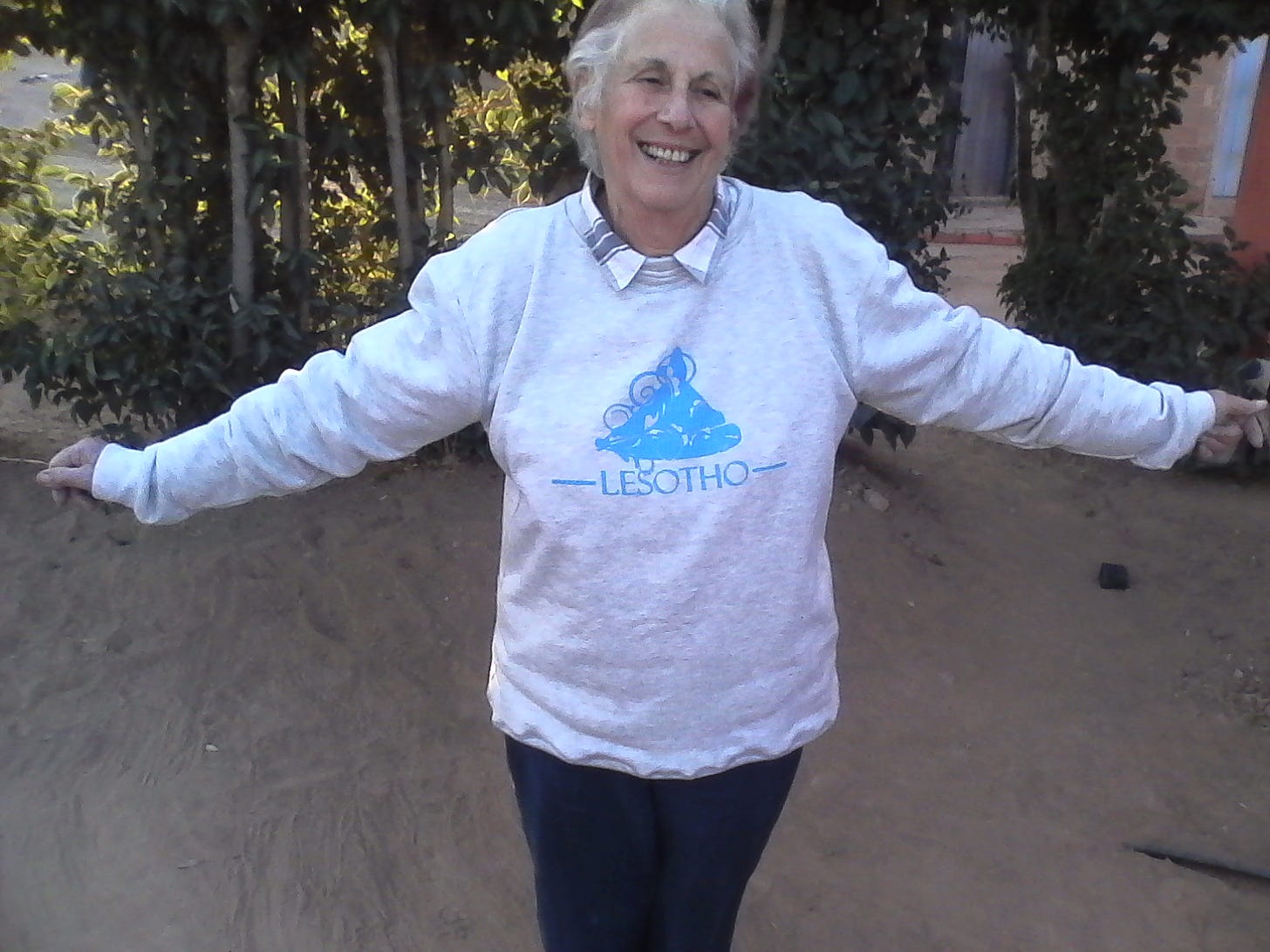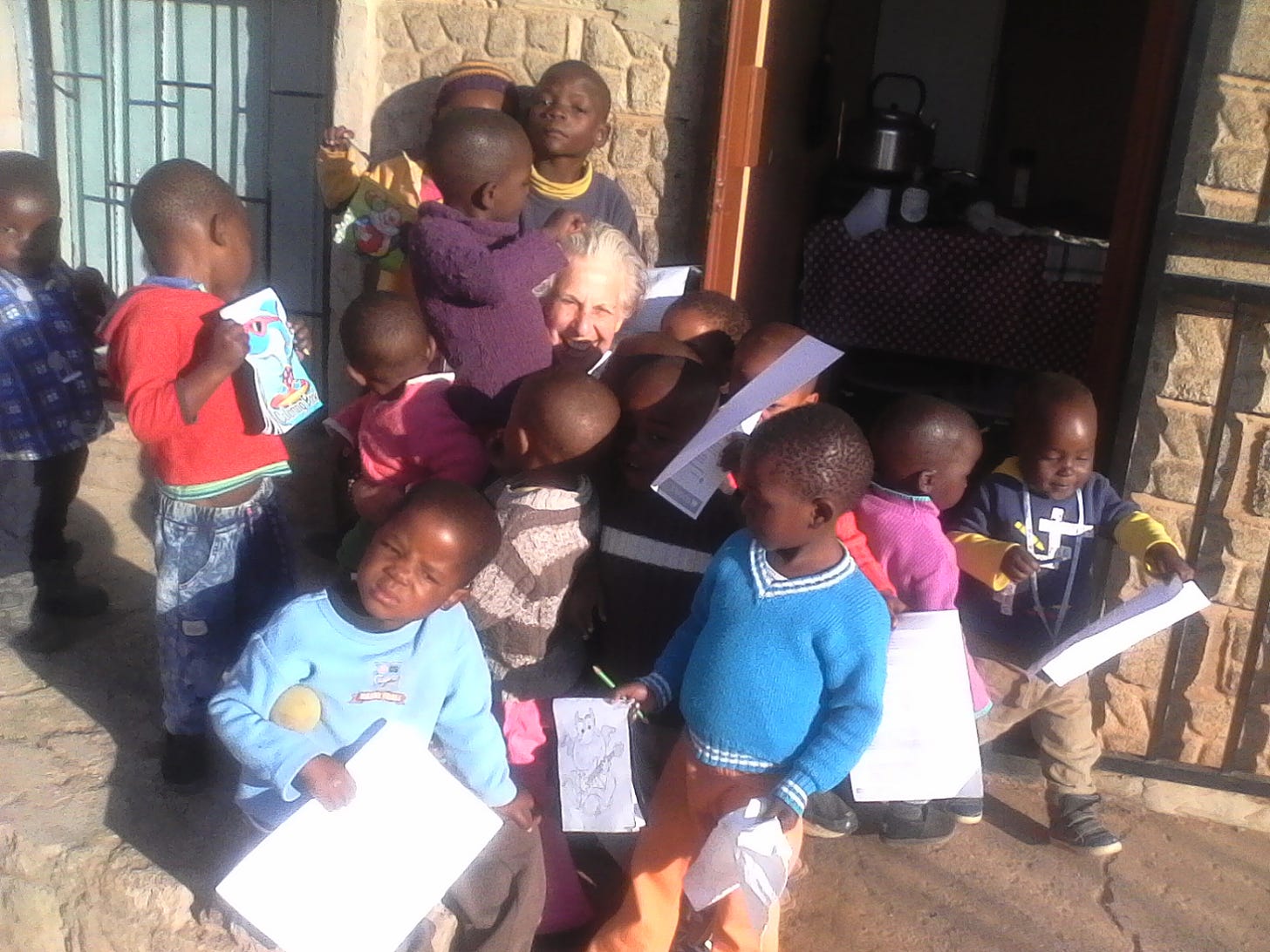What's It Like?: Joining the Peace Corps at 80
Veta Jacqulin Talmadge recalls her time as a volunteer in Lesotho, Africa.
Five years ago, when I was 80, I joined the Peace Corps. I thought, Hey, why not! Songwriter Phil Ochs said it well in the song, “When I am gone”: “I can’t do it when I’m gone, so, I guess I’ll have to do it while I’m here.”
Sometime early in 2016 I heard of someone over 60 who was in the Peace Corps. I thought, Well! I’ll be damned, they take old farts. This took me back to the ’60s when President John F. Kennedy started the Peace Corps; I was raising my three daughters, working and going to school. So not the right time for me. But 2016 was a different story.
It did sound a bit unusual for someone my age to go, although those who know me were probably not too surprised. After much thought (okay, maybe 22 minutes), I applied. It was a long process. First the application, then the Skype interview, then the medical qualifications, then placement.
Sometime early in 2016 I heard of someone over 60 who was in the Peace Corps. I thought, Well! I’ll be damned, they take old farts.
The application was straight-forward. When the interview date was set, the recruiter reminded me not to say “shit.” I practiced using Skype (I’m not very techy), re-positioned the computer from facing the toilet to facing the wall with photos, got “professionally dressed”—and then the Skype didn’t work! It wasn’t my fault, and when you think of it, it’s a bit disconcerting that the United States Peace Corps cannot run Skype correctly. We did the interview by phone, and it went fine. They determined that, given my wisdom acquired over the decades (ha!), I was a good candidate.
Before signing on the dotted line, though, I decided to meet with Phillip, my meditation teacher of 17 years, to get his take on this idea. Dear Phillip was very supportive.
The medical clearance was a horror. Many Peace Corps Volunteers complain about the process; mine was double the trouble. They were extra vigilant because of my age. For example: 1) They asked for records about my hip replacement that was so far in the past, the doctors didn’t have them and it took a half-dozen conversations to clear that up. (Lesson #1—don’t tell them what they don’t need to know). 2) My hearing aids really threw them off. Peace Corps (PC): “What will we need to do to take care of your hearing aids?” Me: “Nothing.” PC “What if you don’t have electricity on site?” Me: “They are battery operated.” PC: “What if, what if, what if…” It took many conversations to clear that up. (Lesson #2—don’t tell them what they don’t need to know). 3) PC: “Any history of back problems?” Oy, vey. (Lesson #3 – see lessons 1 and 2).
Next came placement. The Peace Corps asked for requests of where to serve. I knew I wanted Africa. I had been to Ghana and loved it. Why did I choose Lesotho? Well, I read that Lesotho’s second language was English. Now, this is accurate if you are living in the city; however, in the Villages not so much so. Actually, not at all.
I sometimes walked four to six miles a day, mostly uphill on rocky terrain. I must say I feel stronger now than maybe ever—or at least strong for an old lady.
Then, clearance, passport, purchase of lots of recommended essential items, date set—and away she goes.
My plans posed a challenge for my family. My kids were surprised; they had no idea this was in the plans for their old Ma. It took some serious discussion and processing; in the end, as always, my family was supportive of my new adventure.
I left in mid-September for Philadelphia, for “staging”—the first intro to the Peace Corps, and to the other 57 volunteers who would be my cohorts, mostly just out of college. Three days later we were on a 35-hour trip, with three plane changes, to Lesotho, Africa where it was expected I would spend the next two years. A downside: Being the only volunteer over 50 made it challenging in terms of bonding with my travel companions, and talking about our feelings regarding the work we were doing. People 21 to 25 have different reactions and feelings than an 80-year-old. (Duh).
The first three months were spent in training—learning the language, and about the culture. I realized a bit too late in the game that I could have used some guidance on how to study. It had been decades since I had been in a classroom. The lowest language score possible was a 1+, and that is what I got. They may have passed me because my fellow volunteers said they would stay behind with anyone who did not pass—and then none would be sworn in.
My housing during this time was with a host family. I lived in a separate space—a little one-room house—next to my host mother. She was so sweet and caring. Her husband only came home twice a year. Like so many Basotho men, he worked in the South Africa mines. The neighbors next door had children, so we played together. Soccer is a big deal, and they played with a ball made of plastic bags. They were so excited when I gifted them a real soccer ball upon leaving.
In late December we were sworn in and officially became Peace Corps Volunteers. Most of us had traditional clothing made for the occasion.
Our next stop was to our sites. We arrived by bus and the villagers danced and sang, happy to see us. America is almost revered there. Consequently, so are Americans. The assumption is all Americans are wealthy, and given the standard of living of most Basothos, we are.
My plans posed a challenge for my family. My kids were surprised; they had no idea this was in the plans for their old Ma.
My job was to assist in starting a one-year residential program for teen mothers, age 13-19, and their babies, newborn to age 5. I was excited about this project. I established an advisory committee in the Village, established a timeline for projects, and set up fund raising activities, etc.
The greatest fun was spending time with the children from the orphanage. They ranged from 1-and-a-half to 21. I had coloring books, crayons, blank paper, colored pencils and a stoop outside my house. These little ones, mainly 1-and-a-half to 8, would come knocking on my door at 6:30am after their chores and say, “Mme. Palesa (that’s me), colors.” “Colors” may be the only English word the little ones knew. I would put out the supplies, and sometimes there were a dozen children on my stoop coloring. For the first time, they learned to color and draw. I put up an “art gallery” in the dining room, and they would be so excited to see their work hung.
Many of the children were there because either one or both parents had died of AIDS, or because their mothers were young single women with too many children to handle. Our 1-and-a-half-year-old came because his 14-year-old mother was pregnant and could not take care of both children.
Another activity, during the six-week winter break, was to have math papers for the older children who were interested. I have as much math ability as artistic talent, but neither made much difference. A few of the children really excelled and enjoyed progressing from the simple to the more complex problems (thank goodness for calculators for correcting papers).
The first three months were spent in training—learning the language, and about the culture. I realized a bit too late in the game that I could have used some guidance on how to study. It had been decades since I had been in a classroom.
Mpho, a young Basotho woman, and I conducted an HIV awareness program. Lesotho has the second largest HIV population per capita, in the world. The 12-session program dealt with safe sex, treatment, responsibility of both female and males for protected sex, teaching girls that they can say NO, the consequences of multiple partners, self-esteem, and more. It is a very interactive program.
But it was a challenge to get the 14- to 16-year-olds to be verbal. In school, if a child answers a question wrong, they get punished —could be a slap on the hand with a stick—so, participation is not often easily forthcoming. When they did respond to us, we gave them a cudo —praise. In session 7, one boy answered a question and was not given due praise. He said “Hey, where is my cudo?” It was this same boy that came up to me in the airport when I was leaving, put his arms around me and said, “I will never forget you.” Maybe that is a big part of what doing this kind of service is about.
My housing was a 9x14 room containing my kitchen, bedroom, living room, and office, with an outside latrine. I managed to make this little room really feel like home. I had photos strung across one wall, on yarn with clothes pins. The pots and pans were hung on another wall. I also put up bookshelves and made curtains.
I did have electricity, which was nice, since in the winter it gets dark at 4:30pm. We did not have refrigeration, however. In the winter we put food on a high shelf outside (away from the many dogs). We hauled water in buckets from the tap. (I was fortunate, the tap was not too far away). It just amazed me how very little I needed. I bathed in buckets, washed dishes in buckets, washed clothes in buckets—same buckets, different water. The Latrine was nearby, but was that seat ever cold in the winter! I decorated the latrine walls with calendar photos of kittens. My situation was considered pretty cushy. The volunteers in the mountains mostly had no electricity, had farther to walk for water, and were farther from transportation than I was.
Mpho, a young Basotho woman, and I conducted an HIV awareness program. Lesotho has the second largest HIV population per capita, in the world.
Transportation: a lot on foot. I sometimes walked four to six miles a day, mostly uphill on rocky terrain. I must say I feel stronger now than maybe ever—or at least strong for an old lady. I walked 30 minutes uphill for a “taxi,” which is either a big van or a bus. A bus equipped to hold 18 could squeeze in 24, with packages, chickens, and more. Rides could be costly, given the local economy, and frequently far to get to, so people would do a month’s worth of shopping at once. We volunteers did a lot of hitch hiking. If a driver spoke English, the first thing they asked was “What do you think of your new President?” We often felt that the wrong answer would get us left on the road.
A little about the country: Lesotho is a small country in the middle of South Africa. It’s landlocked and mountainous, and I’m afraid of heights and love the water. I learned to adapt. The country is beautiful. The mountains are magnificent. The sky is incredible—the stars, the milky way, the sunsets, and sunrises. The rain—wow. The sound of the thunder and lightning, is beyond description. There are lots of cattle—donkeys, cows, sheep and cattle dogs. You can set your watch by the herdsmen’s schedule: out to graze at 5:00am and home at 4:30 or 6:00pm, depending on the time of year. And cattle crossing—there are no stop signs in the Village, and the cattle have the right of way.
In my village, Bua Sono, I was the only white person. Although the Basothos see white people in town, I may have been the first old white person they had seen. Everyone was very pleasant. It is customary to say hello to everyone you meet on the road—“Lumella, lumella, lumella,” “Hello, hello, hello.” The children were particularly interested in me and would follow me around, wanting to touch my skin and my hair. They offered lots of high-fives. They would run across the field to give one.
In session 7, one boy answered a question and was not given due praise. He said “Hey, where is my cudo?” It was this same boy that came up to me in the airport when I was leaving, put his arms around me and said, “I will never forget you.”
My adventures weren’t limited to Bua Sono. While I was there, I took a couple of trips beyond the village. I went on a Safari, which was awesome. Even more awesome was going to a cheetah reserve to volunteer for the day. I slept in the compound with three cheetahs. They have very big teeth! I almost got a tattoo, but chickened out. I did get my hair dyed red. That was a disaster.
Unfortunately, I didn’t do much formal meditation practice, as I do at home. I don’t know why. I had the time. My main meditation practice occurred when I was walking. I was pretty much able to be in and with my body then. I guess I could have spent my time getting enlightened, and blew it.
I came home August 14th, 2018, earlier than I had planned, for personal reasons. I’ve missed Lesotho since then. But I am very glad to be back with my dear family, friends.









Kudos. What a wonderful adventure. Simultaneously invigorating and peaceful to read. I think you did get enlightened during those walks, fully in your body and in the moment.
Love it! I served in the Highlands of Papua New Guinea with two other twenty-somethings and one sixty-eight year old former nun with a PhD in Chemistry. The oldster was the only one of us to never have a health issue in the entire two years. Though she'd never done it before, she insisted on students calling her "Doctor Murrill" because so few girls and women were educated there.